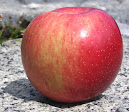 |
I learned of this new apple last Tuesday from a thoughtful reader's comment. Fat chance, thought I, to find it anywhere in my neck of the woods this year.
The next morning I read a short blurb about the apple in the Boston Globe; I was able to buy some that afternoon. Update: They were gone without a trace the following Sunday. Short season!
Junami is a large apple of no particular shape. It's round, of course, but some samples are squat and spherical and others are tall. Most are a bit conical.
They bulge asymmetrically, with hunchback shoulders and irregular profiles and deep stem wells. For all that, the ribbing is moderate.
Junami's red blush is mostly streaky, over yellow tinged with green, but enough sun can darken that color to a saturated crimson. Mine glisten with wax.
These samples sport some russet in the stem well, and the calyx of each is partially open. There is almost no aroma; controlled storage can do that.
Eating Junami
The flavors are stongly floral, sweet but with some balancing tart.
I get a bit of grain into the bite, and something soft and succulent. The peel is a bit chewy and can add a sweet-grass note.
The net effect is quite satisfying, with winning texture and taste. Junami is a welcome alternative to the ultrasweet modern apples that dominate the winter and spring.
 Junami is the marketing name for this variety, though it is sold as Diwa in Switzerland, where it was bred. It was patented as Milwa in the United States in 2009, so perhaps that is its actual name.
Junami is the marketing name for this variety, though it is sold as Diwa in Switzerland, where it was bred. It was patented as Milwa in the United States in 2009, so perhaps that is its actual name.
They certainly got this variety to market fast!
I do not understand any of these names, none of which suggest apples to me. But it is worth knowing that Junami rhymes not with "pastrami" but rather with "apple tree" ("JunaMEE").
Junami has great bloodlines, being a descendent of (among others) Ida Red and Elstar. It ripens in September, but keeps well, and improves in storage. Great texture from Ida, intriguing tastes from Elstar.
This is another club apple, and in North America I think its entire output may be from Rainier Orchards in Washington. I wonder how many trees are powering this national rollout.

Whoa. cool. Haven't seen this one in So Cal yet.
ReplyDelete